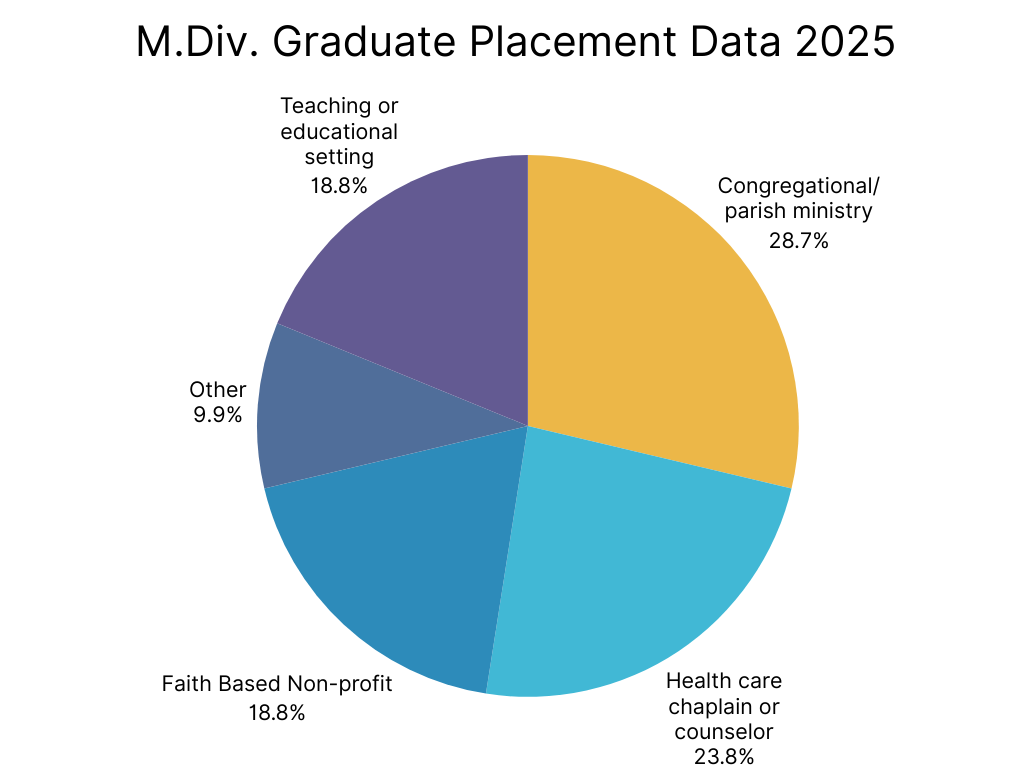What is the Master of Divinity at Vanderbilt?
The M.Div. degree at Vanderbilt Divinity School is a a three-year (when taken full-time), 72-credit professional program. As an inclusive space for all faiths, backgrounds, and academic interests, the Master of Divinity is designed to prepare persons for the practice of ministry. However, a definite commitment to the ministry is not a prerequisite for admission. For many Christian denominations, however, the M.Div. is the degree required for ordination. As an ecumenical school, VDS provides requisite courses for students on the ordination track in Protestant denominations and in the Unitarian Universalist Church.
The vocation of Christian ministry is to interpret and represent Christian faith and to explore ways by which that faith can be embodied in the lives of people, the churches, and society. Through our experiential and radically hospitable community, this program begins a lifelong process of education focusing on understanding the Christian faith and its implications for human life.
Master’s in Divinity Curriculum
The faculty believe that all courses in the M.Div. curriculum should contribute to this aim: the study of backgrounds, origins, and traditions; reflection on problems of faith and on moral, ecclesiastical, and social issues in the contemporary situation; and consideration of occasions of ministry, such as worship, preaching, counseling, administration, education, and social reform. All of these studies and activities presuppose and relate to one another in essential ways. Ministers are theologians, and as such draw on the full range of critical studies and reflection in their varied activities.
The curriculum is structured to combine:
- A flexible foundation upon which students customize their degree program based on vocational interests and a variety of concentrations.
- For-credit immersion experiences that integrate learning and praxis, head and heart, through field education.
- A capstone course project that is organized around a problem the student has encountered in ministry. The student uses what they have learned to analyze and address the problem. The project is drafted and refined through peer and faculty feedback given in a seminar setting.
Additional M.Div. Program Information
Students in either the M.Div. or the M.T.S. may take graduate-level course work in other Vanderbilt University departments and may count these hours toward requirements for graduation. Such outside coursework is subject to the rules that apply to transfer work.
Some students may enter upon their theological studies with previous work in one or more required curriculum subjects. Students may opt to waive individual courses, provided they have taken comparable coursework in the area at the undergraduate level. They may opt to transfer classes (up to 12 hours), provided they have taken them at the graduate level at a school accredited by the Commission on Accrediting of the Association of Theological Schools. The Associate Dean of Academic Affairs must approve waivers and transfer work. If a waiver is granted, another course in the same subject area must be taken. Students should consult with their advisors about the matter.
This openness to interdisciplinary learning and flexibility is one way we present ourselves as an integral part of Vanderbilt University—fostering innovation, ethical engagement, and cross-campus collaboration.
M.Div. Program Outcomes
-
100%
of our graduates are in a vocational placement within a year.
*2024-2025 ATS Data

M.Div. Degree Eligibility
Applicants to the MTS and MDiv degree programs must hold a baccalaureate degree from an accredited college or university. We strongly recommend an average GPA of 2.9 or higher. If you do not hold an undergraduate degree or have a degree from an unaccredited institution, but otherwise show experience and promise for graduate theological education, you may still be eligible.